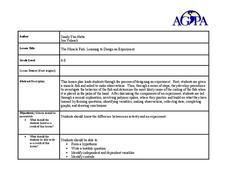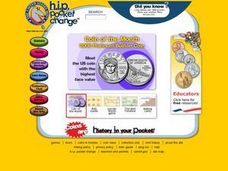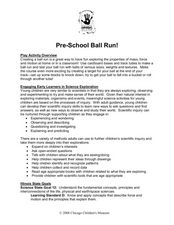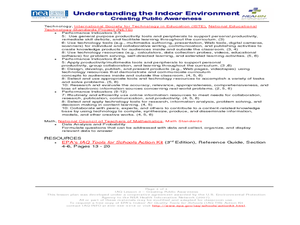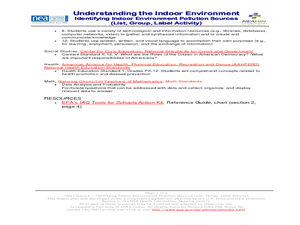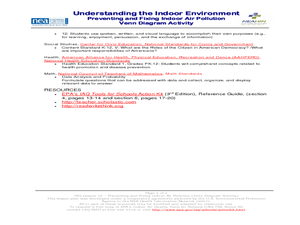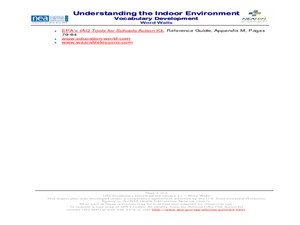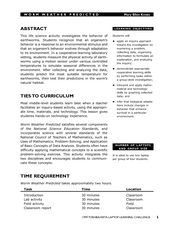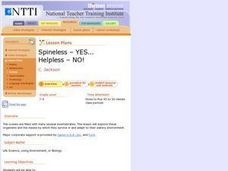Curated OER
The Miracle Fish: Learning to Design an Experiment
Students develop procedures to explore the behavior of fish. In this scientific experiment lesson plan students from a hypothesis, write a question, identify different variables and controls in their experiment.
Curated OER
The Fault Line
Students use cardboard models of the North American and Pacific plates and sand to investigate what happens when there is an earthquake or movement along the boundaries of the plates.
Curated OER
How Many Drops?
Students conduct a simple test to determine how many drops of each of three liquids can be placed on a penny before spilling over. They come up with an explanation for their observations about different amounts of liquids a penny can hold.
Curated OER
The Cantankerous Pathogen
High schoolers explore what factors influence the spread of infectious diseases. They explain how human manipulation of the environment affects the transmission of diseases.
Curated OER
Pre-School Ball Run
Students demonstrate force and motion by rolling a ball through a tube. In this motion lesson students explore what happens to the ball when it is rolled with other balls of various sizes, weights, and textures.
Curated OER
A Pre-Treatment Model for Ethanol Production Using a Colorimetric Analysis of Starch Solutions
Students recognize the benefits of ethanol and study photosynthesis. In this ethanol instructional activity students complete an experiment that shows the procedure that starch can be hydrolyzed by salivary amylase.
Curated OER
Creating Public Awareness - Indoor Air Quality
Students design a poster about indoor air quality. In this indoor air quality lesson, students make a billboard that tells the occupants of a building about at least one air quality problem.
Curated OER
Movement of Air Mind Map Activity
Students explore the movement of air. In this air lesson, students discuss and give examples of air ventilation. Students compare outdoor and indoor air quality. Students create mind maps as a visual representation of what they have...
Curated OER
Understanding the Indoor Environment: The Movement of Air
Young scholars discuss HVAC to assess prior knowledge. Students create a rubric to assess their modals of HVAC units, and build the models according to instructions and discussion by the teacher.
Curated OER
Identifying Indoor Environment Pollution Sources (List, Group, Label Activity)
Students identify the cause of indoor air pollution. In this indoor air pollution lesson, students list, group, and label sources of indoor pollution. They brainstorm a list of all of the indoor pollutants they can think of before...
Curated OER
Understanding the Indoor Environment:Preventing and Fixing Indoor Air Pollution
Students explore air pollution. In this environmental studies lesson, students work with a partner to create a Venn diagram comparing and contrasting possible solutions to prevalent indoor air pollution problems. Students discuss and...
Curated OER
Invention Project
Students study air pollution and design inventions to prevent indoor environment problems. In this air pollution inventions lesson, students read about and discuss famous inventors and inventions. Students then research indoor air...
Curated OER
Indoor Air Quality
Students make a work puzzle using air quality vocabulary. In this air quality vocabulary instructional activity, students design a word puzzle using a teacher designated number of vocabulary words. They peer edit the puzzles with their...
Curated OER
Pattern
Students describe examples of the relationship between structure and function in living systems, particularly with regard to specialized tissues and organs. They describe examples of biological diversity and adaptation of organisms with...
Curated OER
Photosynthesis and Biomass Growth
Sixth graders examine renewable energy sources such as ethanol. In this photosynthesis and biomes lesson students complete a project on farming techniques.
Curated OER
Understanding the Indoor Environment: Word Walls
Students study vocabulary words about indoor air quality. In this indoor environment lesson, students create a word wall with vocabulary words about indoor air quality and pollutants.
Curated OER
Blooming Thermometers
Students study phenology, or the study of climate change. They research the Japanese springtime festival of Hanami and plot and interpret average cherry blossom bloom date data from the past 1100 years.
Curated OER
Worm Weather Predicted
Students examine worm habitats. In this animal habitats lesson, students participate in a lab activity that requires them to explore the adaptations that earthworms make to their environment.
Curated OER
Spineless - YES... Helpless - NO!
Students distinguish between invertebrate and vertebrate organisms while examining the zoological classes of a number of invertebrates. They illustrate a food web of these organisms and investigate the impact of humans on the oceanic...
Curated OER
Enhancing Uptake of Glucose in Rabbit Muscle Cells
Students observe diffusion of glucose through a cell membrane and research the function of chromium picolinate in glucose uptake into a cell. They conclude and understand the role of insulin and chromium picolinate in the uptake of...
Curated OER
Catalase Enzyme
Pupils design and conduct an experiment to test their ideas about how to speed up or slow down the rate of an enzyme-catalyzed reaction. They have access to an array of physical and chemical factors that might influence enzyme activity....
Curated OER
Volcanoes And Atmospheres
High schoolers identify the volcano as the primary source of atmospheric gases, to explain the formation of ozone, and to recognize the dangers of volcanic gases through the use of technology in the classroom.
Curated OER
Biofilms Are Everywhere
Students research biofilms and create brochures. They role play as advertising firm members assigned to educate the general public about biofilms. They create "wanted dead or alive" posters about harmful and helpful biofilms respectively.
Curated OER
Clouds
Third graders complete various activities about clouds. They create a cloud in a lab, write a cloud story, make a cloud model and complete a webquest.


